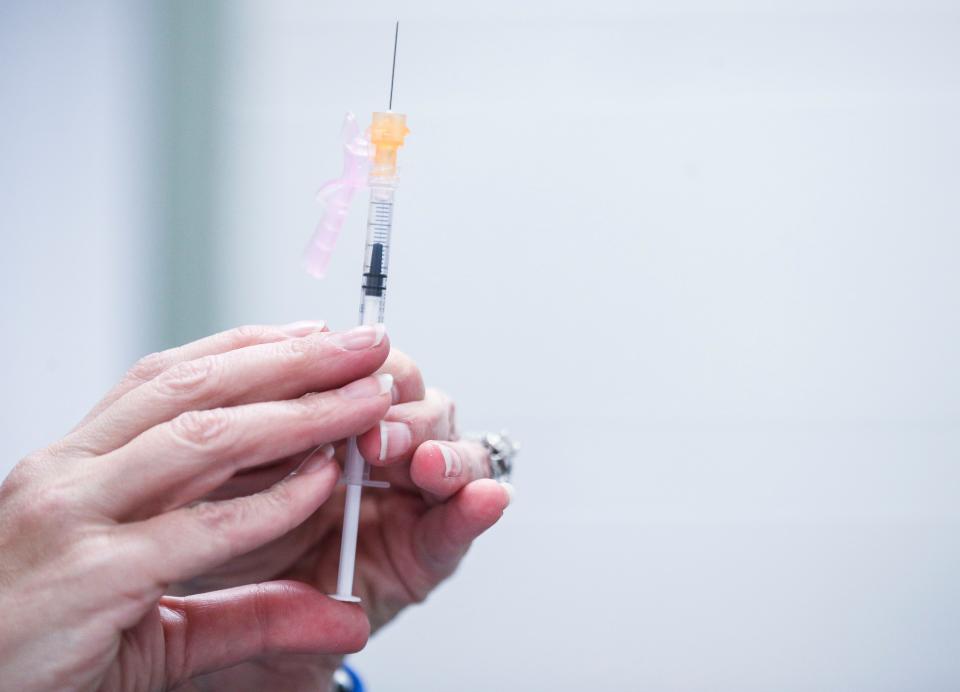Wake up! We're still in a pandemic. And vaccines are our best defense against long COVID.
The COVID-19 deniers are being faced with a new reality, that of long COVID-19, and no amount of disinformation on how it is not dangerous can make this danger go away.
A study published last month documented that long COVID-19 is more dangerous than the flu. And the coronavirus' dangers are compounded by how easily it can spread.
The chance of becoming severely sick from COVID-19 when attending a January indoor function is far too great not to take preventative measures. And once you become sick, do not count on developing any long-term protective immunity to this rapidly changing, immune-evasive virus. Infections also tear down, not build, immunity to other infections.
The exact incidence of long COVID-19 after infection is difficult to determine, but I know far too many friends who have developed this disorder to discount its dangers. Once contacted, approximately 50% of patients do not rid themselves of debilitating symptoms of long COVID-19.
And the cumulative multisystem damage and incidence of death from these delayed manifestations have been found to be even greater than those arising from acute infections.
Nobel Prize winner was long ignored. But her mRNA work led to COVID vaccine.
Vaccines are our best defense against long COVID
The good news is that vaccines are one of the best ways to help prevent long COVID-19. After a large literature review, a study published in October found that three doses of a vaccine had a 69% efficacy in prevention. A more recent study reported a higher efficacy of 73%.
Even in those who have been previously infected with the coronavirus, vaccines have been observed to decrease long COVID-19 symptoms by 40%.
Unfortunately, similar to cold sores, chicken pox and mono, the coronavirus may persist in individuals leading to chronic symptoms.

Our response is inhibited by disinformation that's mutating and spreading faster than the virus and discourages our population from adopting public health measures. This could be part of an asymmetric warfare effort that had its origins early in the pandemic. Hundreds off thousands of bots have been implicated in its spread, bots that can now be supercharged by artificial intelligence.
The latest scare is that the public will acquire minuscule amounts of DNA from the vaccine. Reality check: This is more likely to happen every time one eats a steak or even a carrot. The DNA does not enter a cell’s nucleus or affect our genes, and the body efficiently handles this occurrence.
COVID continues to rapidly change. Herd immunity is a pipe dream.
Relying on herd immunity is also a pipe dream; it does not exist. People are being reinfected, and long COVID-19 is frequently occurring.
The damage appears to be additive. The incidence of long COVID-19 in the CDC’s pulse survey of adults with previous COVID-19 has dropped in half, but then stabilized at 11%.
Its peak incidence is found in ages 30 to 49, possibly because this age group is one of the most vaccine hesitant.
Do you need a COVID booster? From RSV vaccine and flu shot to COVID booster: How to sort through vaccination noise
The public’s reliance on the publicly built and accessed Vaccine Adverse Event Reporting System's database is misguided. This data is easily manipulated and only points to possible problems.
Other sources such as the Epic Research’s COSMOS initiative, the Veterans Health Administration’s patient records and the CDC’s V-safe program are much more secure and reliable.
Opinion alerts: Get columns from your favorite columnists + expert analysis on top issues, delivered straight to your device through the USA TODAY app. Don't have the app? Download it for free from your app store.
Vaccinations are one of our best defenses against long COVID-19. People can have severe vaccination reactions, but these are rare – and are much rarer than with infection. However, if one does the math, a 75% reduction in long COVID-19 with vaccination is still not great with a highly infectious virus. But it is exceedingly better than zero.
Other steps are necessary to prevent infection. These include improvements in ventilation and the abandonment of cloth masks for the use of KN95 and N95 masks.
We are still in a pandemic. We need to wake up as a society before we reach a point of no return, or before the damage to our frontal lobes from repeated viral infections reaches a point where we are unable to form a consensus and effectively respond to this pandemic.

Dr. Kevin Kavanagh is a retired physician from Somerset, Kentucky, and chairman of Health Watch USA. This column first published in the Louisville Courier Journal.
You can read diverse opinions from our Board of Contributors and other writers on the Opinion front page, on Twitter @usatodayopinion and in our daily Opinion newsletter.
This article originally appeared on Louisville Courier Journal: COVID is surging again. Vaccines are our best defense against it

